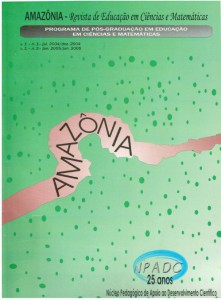An experience of science teaching among members for indigenous communities: a need for open activities
DOI:
https://doi.org/10.18542/amazrecm.v1i0.1619Keywords:
indigenous education, bilingual teaching, intercultural teaching, indigenous teachersAbstract
This a report of an indigenous teachers' trainning experience undertaken by the São Paulo State Education Secretariat for Terena, Kaingang, Krenak, Guarani e Tupi-Guarani ethnic groups. Bilingual and intercultural teaching is an old demand and has been made obligatory through the I996-Brazilian Education Legislation (LDB). The planning for an Indigenous Teachers Trainning Course started in 1999 and the first course was held in 2002. Sixty Indians graduated the 2,220-hour course - 360h of which were face-to-face teaching -In September 2003. The course was based on themes of interest of the students among which: garbage disposal, biodiversity, life cycles, solar system and electricity. The teaching group faced problemas when it chose to present non Indigenous concepts about the universe and were questioned by the students. They presented their interpretation of scientific concepts. These were the most productive and successful teaching/learning moments as they were dedicated to investigate problems according to the students' own perceptions and value system. The building of concepts and intellectual I development were the highlights of the activities and representative of the Indigenous world vision and their way of building scientific knowledge based on their own cultureReferences
CARVALHO, A.M.P., VANNUCCHI, A. I., BARROS,M. A., GONÇALVES, M. E. R. e REY, R.C., Ciências no Ensino Fundamental- O conhecimento físico. São Paulo: Editora Scipione, 1998.
COLINVAUX, D., A Formação do Conhecimento Físico- Um estudo da causalidade em Jeans Piaget, Niterói: EDUFF e Rio de Janeiro: UNIVERTA, 1992.
COMISSÃO DE DIREITOS HUMANOS DA ASSEMBLÉIA LEGISLATIVA DO ESTADO DE SÃO PAULO. Vamos ouvir a voz dos que têm vez. Relatório das Audiências Públicas sobre a situação dos povos indígenas no Estado de São Paulo, Junho de 2002.
D’ AMBROSIO, U. Palestra de abertura do Curso de Formação de Professores Indígenas do Estado de São Paulo, In: SÃO PAULO, Secretaria da Educação do Estado, Magistério Indígena Novo Tempo- Um caminho do meio (da proposta à interação). São Paulo, 2003.
FLEURI, R. M., Multiculturalismo e Interculturalismo nos Processos Educacionais. In: CANDAU, V.M. (org.,), Ensinar e Aprender: Sujeitos, Saberes e Pesquisas. Rio de Janeiro: DP & A, 2000.
GARCÍA, J.E e GARCIA, F.F., Aprendendo investigando, Serie Practica, Vol.2. Sevilla, Díada editoras, 1989.
KAMII, C. e DREVIES, R., O Conhecimento Físico na Educação Pré- Escolar: Implicações da Teoria de Piaget. Porto Alegre: Artes Médicas, 1986.
LAWSON, A. E., Using the learning cycle to teach biology concepts and reasoning pattens. Journal of Biological Education, Vol. 35, n. 4, 2001.
LAWSON, A.E., et al., What kinds of scientific concepts exist? Concept constructions and intellectual development in college Biology. Journal of Research in Science Teaching, Vol. 37, n. 9, 2000.
PIAGET, J. e INHELDER, B., A psicologia da criança. São Paulo, Difel, 1976.
SNIVELY, G. e CORSIGLIA, J., Discovering Indigenous Science: Implications for Science Education. Science Education, Vol. 85, n. 1, 2001.



